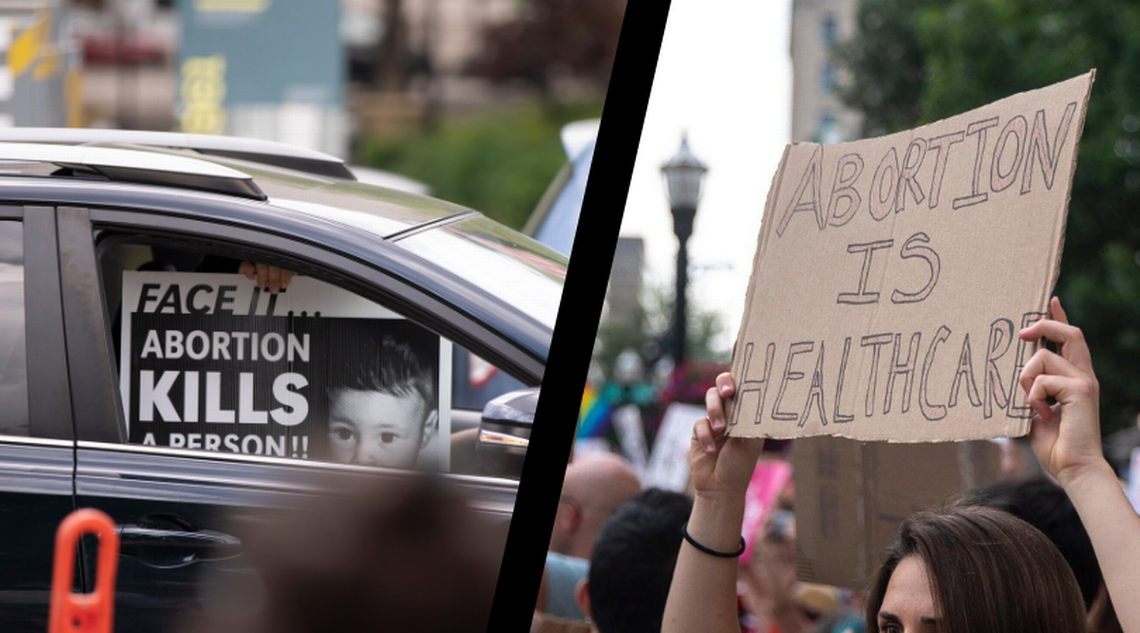Kentucky’s abortion ban will stay in place while lawsuit moves through court, justices say

The Kentucky Supreme Court has denied relief to the state’s two abortion providers, meaning a trigger law banning abortion will continue to remain in effect.
In a Thursday morning opinion, the high court said that cases made by EMW Women’s Surgical Center and Planned Parenthood as to why the trigger law and a ban on abortion after six weeks should be blocked “do not rise to the level of extraordinary cause.” Extraordinary cause is needed in order for the court to halt enforcement of a law in question until a lawsuit challenging its merits is resolved.
The Supreme Court also accepted a transfer of the case from the Kentucky Court of Appeals and set oral arguments for November 15.
Earlier this month, the Kentucky Court of Appeals reinstated the statewide ban, fulfilling a request made by Republican Attorney General Daniel Cameron. Cameron, who is running for governor, had asked the appeals court to overturn a lower court’s ruling that blocked his ability to enforce the ban. He rebuked Jefferson Circuit Court Judge Mitch Perry’s injunction, saying it “threatens to plunge Kentucky’s courts into a political firestorm that will inevitably erode the integrity and independence of the judiciary.”
In the high court’s refusal on Thursday to overturn the ban, Supreme Court Justices Debra Lambert, Robert Conley and Laurance VanMeter concurred. Justice Michelle Keller concurred in part and issued a separate opinion that Justice Christopher Shea Nickell joined. Chief Justice John Minton concurred in part and also dissented, issuing a third opinion that was joined by Justice Lisabeth Hughes.
Four of the seven justices lambasted the Court of Appeals for its decision to reverse the lower court’s injunction and allow Attorney General Cameron to enforce the ban while the case is still being worked through in court.
Because of this “abuse of discretion,” Chief Justice Minton and Justice Hughes, in their opinion, did find sufficient reason for extraordinary cause, adding that trigger law should’ve remained blocked until the lawsuit is resolved.
Both justices criticized the appeals court for “failing to engage in any analysis” explaining why it saw fit to reverse the lower court’s injunction.
“Failure to apply the appropriate standard of appellate review is unreasonable and unsupported by sound legal principles,” Minton wrote, adding that the Jefferson Circuit Court’s temporary injunction “should remain in place pending final resolution of this litigation or an intervening change in law.”
In her partial concurring opinion, Justice Keller said she and Justice Nickell, too, shared “concerns” raised by abortion providers regarding the appeals court’s “exercise of its discretion” in deciding to reverse course and allow Cameron to enforce both laws.
“The Court of Appeals not only failed to give appropriate deference to the trial court but also failed to undertake a thorough analysis that is required in a case of this magnitude, failing even to set forth the appropriate standard of review,” she wrote.
Remanding the case back to the appeals court for “proper analysis” would only delay resolution of the lawsuit. And “recognizing that matters of life, death and health are at stake, time is of the essence,” Keller wrote.
She also noted that justices will issue a ruling on the case after voters decide in early November whether to amend the Kentucky Constitution to make clear there is no guaranteed right to an abortion. If passed, it would nullify Planned Parenthood and EMW’s legal argument that access to abortion is protected by the inherent right to privacy outlined in the state constitution.
“We look forward to that expression of the will of the Commonwealth,” Keller wrote.
Chief Justice Minton, in his opinion, said “few modern issues have proven more significant and more political contentious, than access to abortion.”
Addressing people with deeply held opinions on both sides, Minton said the high court acknowledges “the magnitude of our decision with awareness that, regardless of the decision we render, many citizens of the Commonwealth who hold sincere and passionate beliefs will be deeply disappointed.”
But it’s the role of courts, “as neutral, dispassionate arbiters of the law” to “constitute a final check on the vicissitudes of political fervor.”
The state Supreme Court’s ruling, though divided, is a blow to abortion providers, who were forced to stop providing abortion care on July 29. Kentucky’s trigger law criminalizes abortion unless the procedure is necessary to prevent the death or irreversible injury to a major bodily organ of the pregnant person. It does not include exceptions for rape or incest.
The high court’s decision to keep the ban in effect “puts nearly a million people’s health care in jeopardy,” Planned Parenthood and the American Civil Liberties Union of Kentucky, on behalf of EMW, said in a joint statement Thursday. “We will proceed with our case to restore and protect reproductive freedom in Kentucky,” they said. “Politicians and the government should never have the authority to force a person to remain pregnant against their will.”
Democratic Gov. Andy Beshear, in a news conference Thursday afternoon, said the Supreme Court “has left in place one of the most extremist laws in the United States,” noting, as he has in the past, its lack of rape and incest exceptions. “I think that’s wrong, and I think the majority of Kentuckians agree with me.”
Illinois is currently the closest state without abortion restrictions where Kentuckians can go to access the procedure.

 Yahoo Movies
Yahoo Movies 
